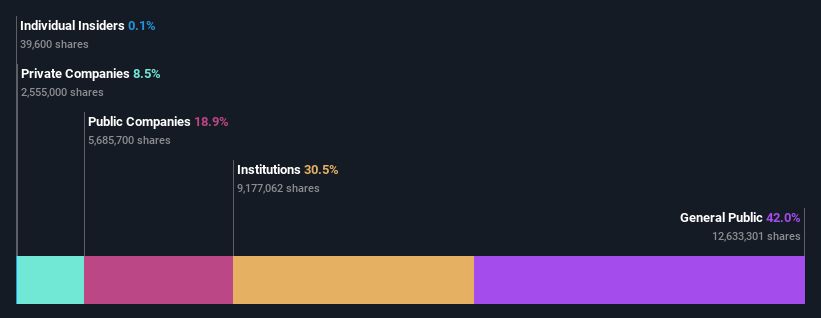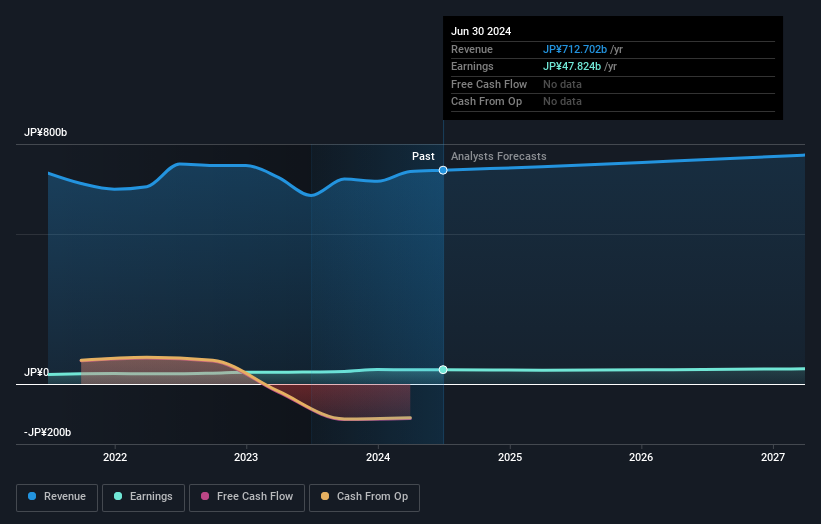Fuyo General Lease Co., Ltd.'s (TSE:8424) top owners are individual investors with 42% stake, while 30% is held by institutions
Key Insights
- Significant control over Fuyo General Lease by individual investors implies that the general public has more power to influence management and governance-related decisions
- A total of 12 investors have a majority stake in the company with 50% ownership
- Institutions own 30% of Fuyo General Lease
Every investor in Fuyo General Lease Co., Ltd. (TSE:8424) should be aware of the most powerful shareholder groups. We can see that individual investors own the lion's share in the company with 42% ownership. That is, the group stands to benefit the most if the stock rises (or lose the most if there is a downturn).
Meanwhile, institutions make up 30% of the company’s shareholders. Institutions will often hold stock in bigger companies, and we expect to see insiders owning a noticeable percentage of the smaller ones.
Let's take a closer look to see what the different types of shareholders can tell us about Fuyo General Lease.
See our latest analysis for Fuyo General Lease

What Does The Institutional Ownership Tell Us About Fuyo General Lease?
Institutions typically measure themselves against a benchmark when reporting to their own investors, so they often become more enthusiastic about a stock once it's included in a major index. We would expect most companies to have some institutions on the register, especially if they are growing.
As you can see, institutional investors have a fair amount of stake in Fuyo General Lease. This can indicate that the company has a certain degree of credibility in the investment community. However, it is best to be wary of relying on the supposed validation that comes with institutional investors. They too, get it wrong sometimes. If multiple institutions change their view on a stock at the same time, you could see the share price drop fast. It's therefore worth looking at Fuyo General Lease's earnings history below. Of course, the future is what really matters.

Fuyo General Lease is not owned by hedge funds. Hulic Co., Ltd. is currently the company's largest shareholder with 14% of shares outstanding. Meanwhile, the second and third largest shareholders, hold 8.5% and 5.0%, of the shares outstanding, respectively.
A closer look at our ownership figures suggests that the top 12 shareholders have a combined ownership of 50% implying that no single shareholder has a majority.
While studying institutional ownership for a company can add value to your research, it is also a good practice to research analyst recommendations to get a deeper understand of a stock's expected performance. There is some analyst coverage of the stock, but it could still become more well known, with time.
Insider Ownership Of Fuyo General Lease
While the precise definition of an insider can be subjective, almost everyone considers board members to be insiders. Management ultimately answers to the board. However, it is not uncommon for managers to be executive board members, especially if they are a founder or the CEO.
I generally consider insider ownership to be a good thing. However, on some occasions it makes it more difficult for other shareholders to hold the board accountable for decisions.
Our most recent data indicates that insiders own less than 1% of Fuyo General Lease Co., Ltd.. But they may have an indirect interest through a corporate structure that we haven't picked up on. Keep in mind that it's a big company, and the insiders own JP¥435m worth of shares. The absolute value might be more important than the proportional share. It is good to see board members owning shares, but it might be worth checking if those insiders have been buying.
General Public Ownership
With a 42% ownership, the general public, mostly comprising of individual investors, have some degree of sway over Fuyo General Lease. This size of ownership, while considerable, may not be enough to change company policy if the decision is not in sync with other large shareholders.
Private Company Ownership
It seems that Private Companies own 8.5%, of the Fuyo General Lease stock. Private companies may be related parties. Sometimes insiders have an interest in a public company through a holding in a private company, rather than in their own capacity as an individual. While it's hard to draw any broad stroke conclusions, it is worth noting as an area for further research.
Public Company Ownership
Public companies currently own 19% of Fuyo General Lease stock. It's hard to say for sure but this suggests they have entwined business interests. This might be a strategic stake, so it's worth watching this space for changes in ownership.
Next Steps:
While it is well worth considering the different groups that own a company, there are other factors that are even more important. To that end, you should learn about the 2 warning signs we've spotted with Fuyo General Lease (including 1 which is concerning) .
Ultimately the future is most important. You can access this free report on analyst forecasts for the company.
NB: Figures in this article are calculated using data from the last twelve months, which refer to the 12-month period ending on the last date of the month the financial statement is dated. This may not be consistent with full year annual report figures.
Have feedback on this article? Concerned about the content? Get in touch with us directly. Alternatively, email editorial-team (at) simplywallst.com.
This article by Simply Wall St is general in nature. We provide commentary based on historical data and analyst forecasts only using an unbiased methodology and our articles are not intended to be financial advice. It does not constitute a recommendation to buy or sell any stock, and does not take account of your objectives, or your financial situation. We aim to bring you long-term focused analysis driven by fundamental data. Note that our analysis may not factor in the latest price-sensitive company announcements or qualitative material. Simply Wall St has no position in any stocks mentioned.
 Index Options
Index Options CME Group
CME Group Nasdaq
Nasdaq Cboe
Cboe TradingView
TradingView Wall Street Journal
Wall Street Journal